You’ve got to talk to the chicken, you understand? TALK to the chicken. Peter! Put the camera down and pay attention over there!
I glanced at hubbie out of the corner of my eye, and saw him unsuccessfully trying not to giggle. Talking to a chicken leg simmering away in a tagine hadn’t been on his list of things to do today. Or ever in fact. Usually he gets to hide behind the camera whilst I take on the harder job of interaction and activity, but for once he wasn’t getting away with it, and I was enjoying the consequences.
A day at La Maison Arabe Cooking School
It hadn’t been the best of starts. Supposedly the chef of the family, I began the workshop at La Maison Arabe Cooking School in Marrakech by putting my apron on inside out. What a school girl error. Hubbie didn’t bother to hide his amusement as I pretended to laugh it off whilst our formidable yet friendly host Wafa firmly whipped it off and made me put it on properly.
There would be no messing about in her class!
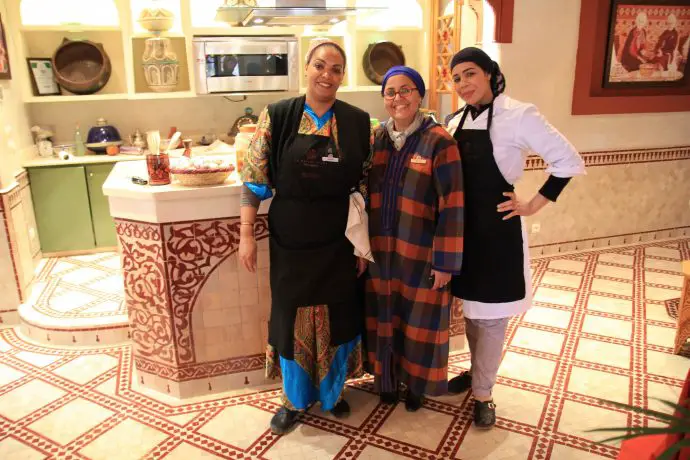
The morning had begun with mint tea and pastries at La Maison Arabe hotel. To be honest it was a bit too early for such an onslaught of sugar, and still being full from breakfast we nibbled like polite little English church mice until we’d made a respectable enough dent in the delicacies. I wanted to take them all home in a doggy bag but hubbie didn’t think that would be quite the thing to do in such an elegant establishment. He was probably right.
We’d chosen to hone our culinary skills at La Maison Arabe Cooking School because we’d eaten at their achingly romantic poolside restaurant last year and tried (and enjoyed!) the unlikely marriage of roasted duck with chocolate sauce. Yes really! They clearly know a thing or two about food, which isn’t surprising since La Maison Arabe was the very first restaurant to open in Marrakech back in 1946. I loved that it was established by two women, and over the years has been graced by many a famous face, Sir Winston Churchill and Jacqueline Kennedy to name just a couple. And if it’s good enough for them…
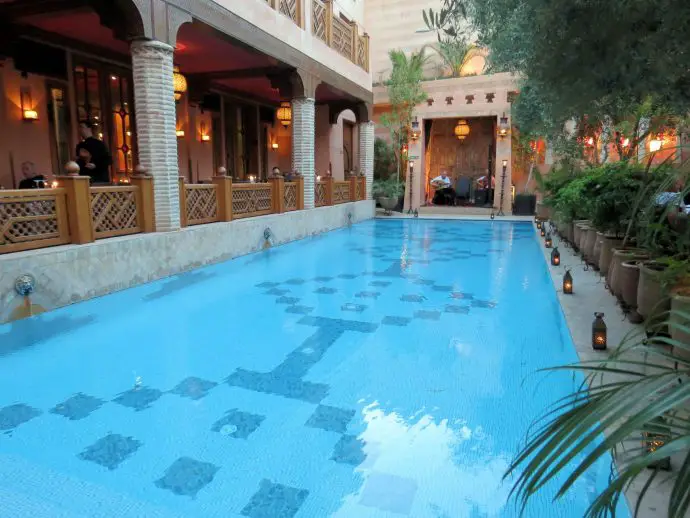
The cooking school was set up in 2001 by current owner Prince Fabrizio Ruspoli after he realised the hotel guests were keen to learn the secret recipes behind what they were eating. It was the very first cooking school in the Kingdom of Morocco, and perhaps also a reaction to the many restaurants which had sprung up in Marrakech. Most of them dumbed down the very essence of Moroccan cuisine to cater for the supposed rather feeble palates of the increasing number of Western tourists. During the class we were able to determine for ourselves the amount of hot stuff we wanted in our dishes, and although I probably overdid it slightly, it was good to have the choice.
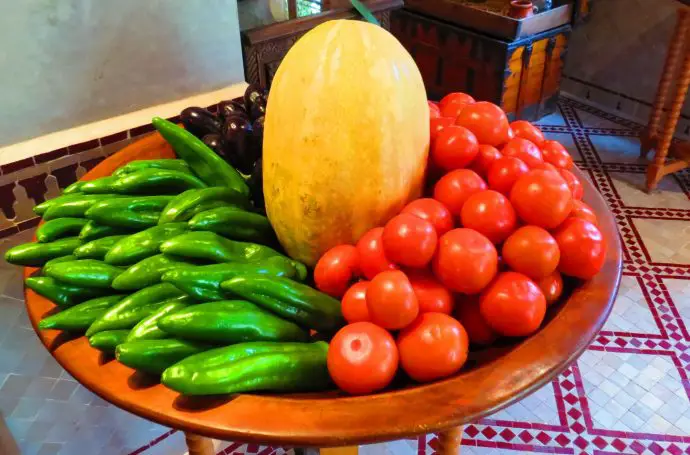
Having met our fellow prospective chefs we piled into a couple of minivans and headed 15 minutes out of town to the country annexe belonging to La Maison Arabe. A fairly new addition to the family, this countryside kasbah opened as a cooking school in January 2015. The enclosed walled gardens felt a world away from the bustle of the medina. As much as I love the intoxicating chaos of the city, it is refreshing to sometimes step away from it all and enjoy the simple pleasures of the countryside. Like the buzzing of bees on the lavender. Or the birds calling to each other from the orange trees.
Our lesson began as we sat companionably around a large outside table (still warm enough even in January!) and listened to Wafa explaining the background of Moroccan cooking. Whilst hubbie was itching to get hands on with the food, I found the insight fascinating. But then I always was a bit of a goody two shoes at school. I loved the way Wafa described, in perfect English, how food is an open door to Moroccan culture, and a shared language. Thinking about it, that totally makes sense. You can learn such a lot from a nation’s cuisine, although being British, I’d hate to be judged by our country’s culinary inventiveness!
So here comes the history bit…
Moroccan cuisine is an Arabic, Jewish and Moorish fusion, each culture having contributed parts of their own unique identity and flavour over the centuries. Spices were introduced by the Arabs, whilst the Moors from Andalucia brought pigeon pie, or pastilla to the table. Pastilla and it’s intricate layers of filo pastry is traditional Moroccan party food! The famous preserved lemon used so often in Moroccan dishes came from the Jews, as well as the concept of pickling vegetables so food could be stored and relied on during times of hardship. And the Moroccan breakfasts we know and love today? Those croissants, pancakes and baguettes are courtesy of the more recent French and Spanish influence. The wine too, although perhaps not at breakfast!
Next up was a stroll through the herb garden where Wafa gave names to the heavenly aromas lingering on the warm morning breeze. It would have been fun to pick some of our own ingredients but I think the winter season and the class recipes dictated otherwise. Did you know that saffron is best picked before sunrise during October, and that it takes over 70,000 blossoms to make just one pound of saffron?
So that’s why it’s the most expensive spice in the world!
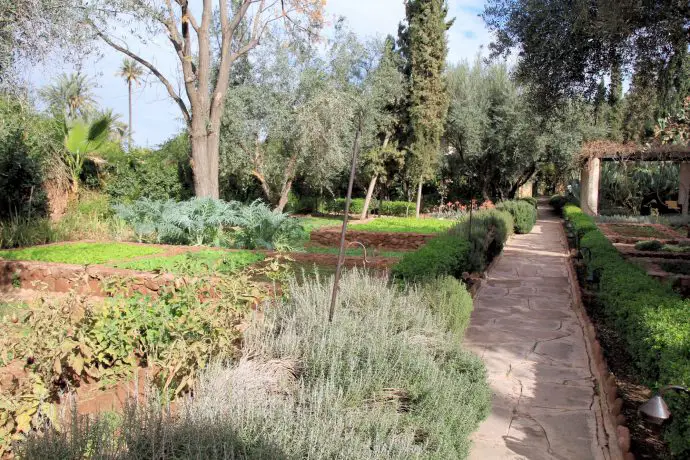
Then it was on to the garden pavilion to learn how to make Moroccan flat bread (khobz) using a traditional clay oven typically used in rural areas. Bread is the staple of Moroccan cuisine, and is eaten with pretty much everything except couscous or pastilla. We each took turns at massaging the dough into a rounded shape on the wooden paddle before helping to slide it carefully into the oven.
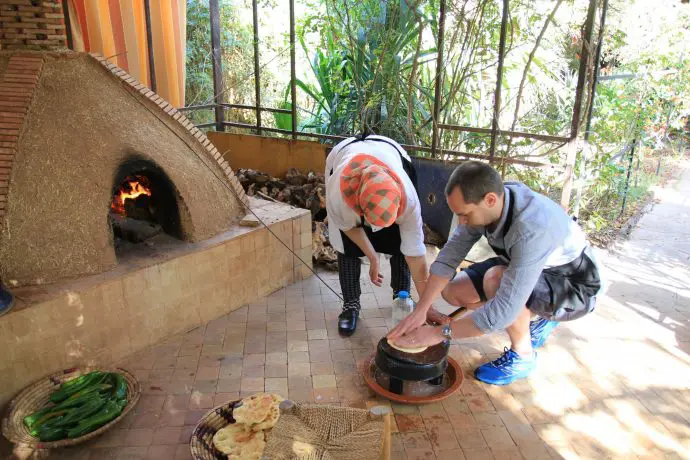
Whilst we waited for it to rise Wafa explained the theory behind the theatrical mint tea performance that is such an integral part of Moroccan hospitality.
Mint tea is always poured from a great height for 3 reassuringly simple reasons:
- To aerate the tea – the froth produced gives it the nickname ‘Berber Whiskey’
- To cool the tea – it gets pretty hot in those teapots
- To show off! You heard it here first.
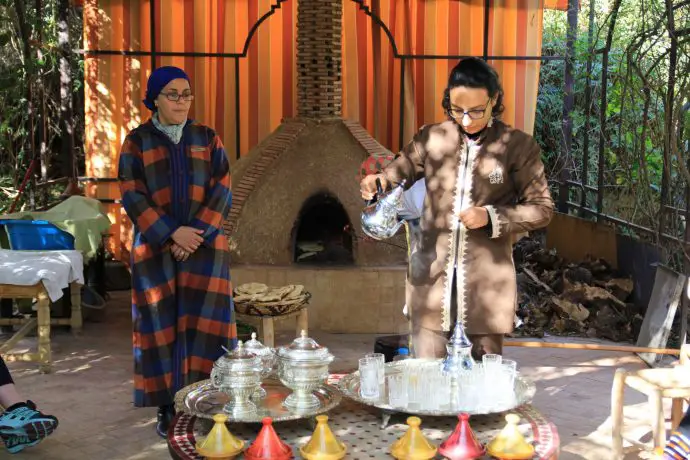
Sitting in dappled light under the leafy pergola, we enjoyed several glasses along with the freshly baked bread which we dipped in olive oil, argan oil and honey. You can’t visit Morocco and not come across argan oil. Known as ‘liquid gold’, argan oil is a key ingredient in both cooking and beautifying, and yes, it’s the tree often inhabited by climbing goats! The trees only grow in a small region of south western Morocco, and nowhere else in the world.
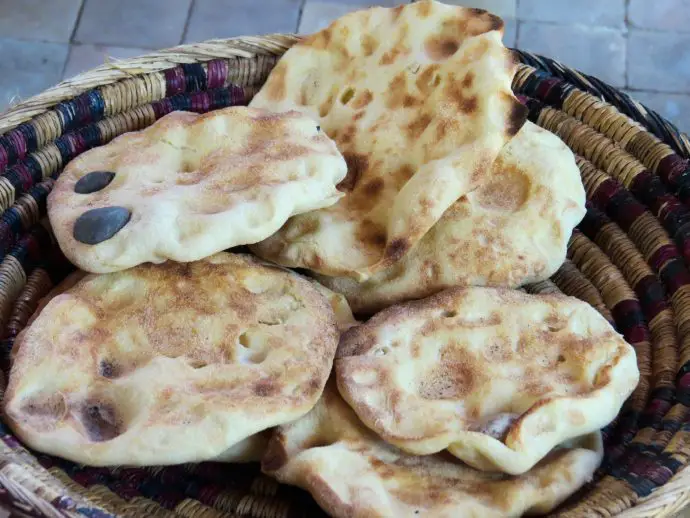
Finally it was time for some cooking, and standing like expectant school children behind our work stations we were introduced to our Dada, Amina, who would be showing us the ropes for the next couple of hours. We all had a screen monitor so we could see exactly how to prepare each item. Wafa was doing the rounds to offer assistance where needed, and to keep an eye on hubbie who kept disappearing with the camera.
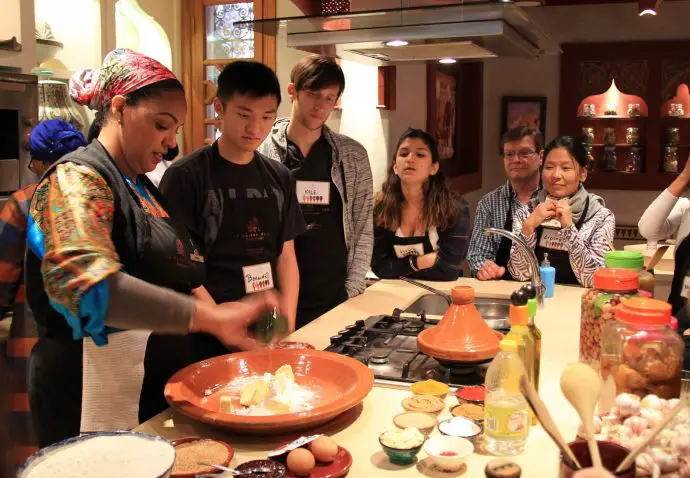
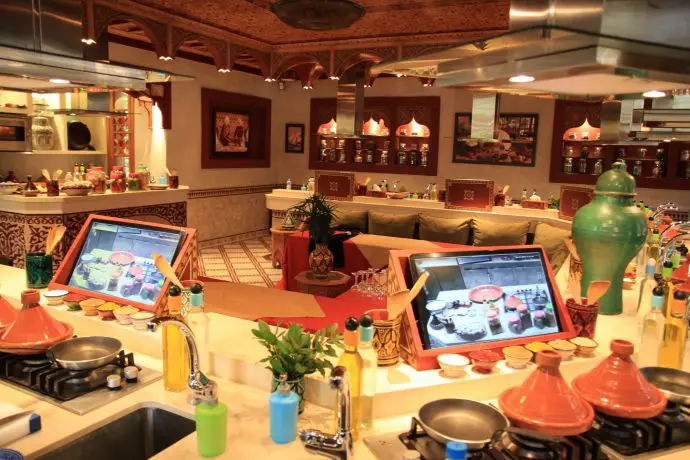
We chopped, diced and sizzled our way through a couple of traditional Moroccan salads – the famous aubergine zaalook and tomato and roasted pepper taktuka. Relatively simple dishes but oh so tasty. Probably something to do with the liberal amounts of cumin involved. There’s always cumin. Which isn’t necessarily a bad thing as it’s great for aiding the digestive system and overcoming food poisoning. Incidentally hubbie and I have never been struck down by the traveller tummy bug whilst in Morocco!
I went a bit overboard with the oil whilst Hubbie’s was the picture of perfection. Don’t tell him I said that.
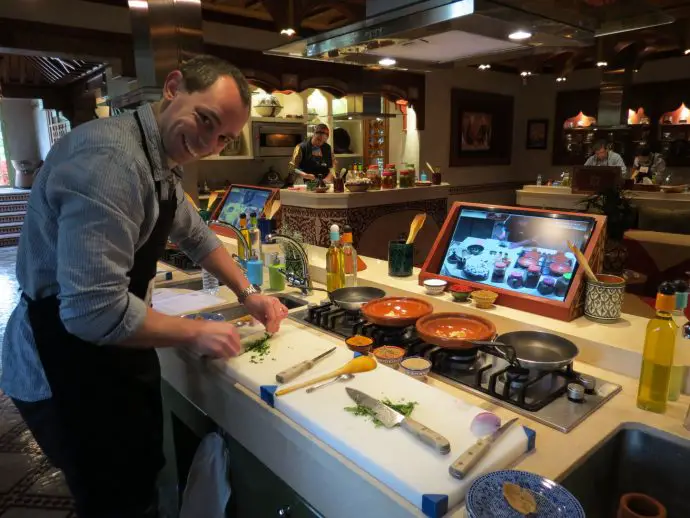
Then came the main event. The not so humble tagine.
Something I’ve tried many times at home with varying degrees of success, but never with chicken. I’ve always been a bit suspicious of the ‘chicken with preserved lemon and olives’ tagine, and have avoided it ever since a bad culinary experience in Tunisia a few years ago. So I wasn’t expecting to enjoy eating my creation, although it would be fun cooking it. Yet after we’d been gently scolded (still not sure if she was joking) by Wafa for chopping our onions the wrong way, and had a rather one-sided conversation with our chicken (again, not sure if she was joking!), the finished result wasn’t actually half bad!
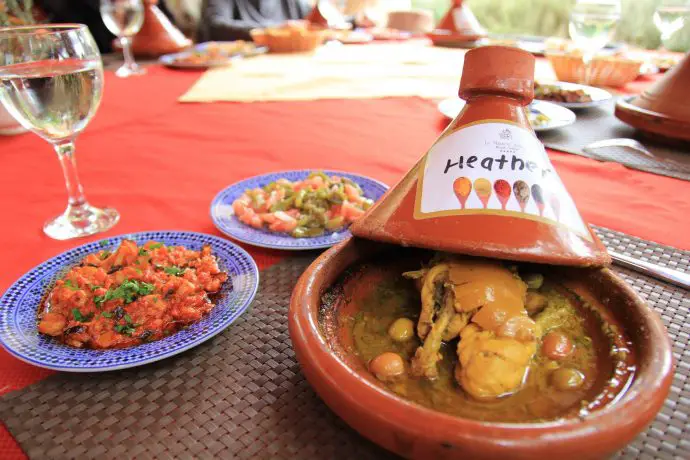
We all sat around the communal table in the garden to enjoy our meal, making the appropriate noises of admiration at the culinary prowess of our companions whilst secretly thinking that ours was the best!
It’s of course how it should be.
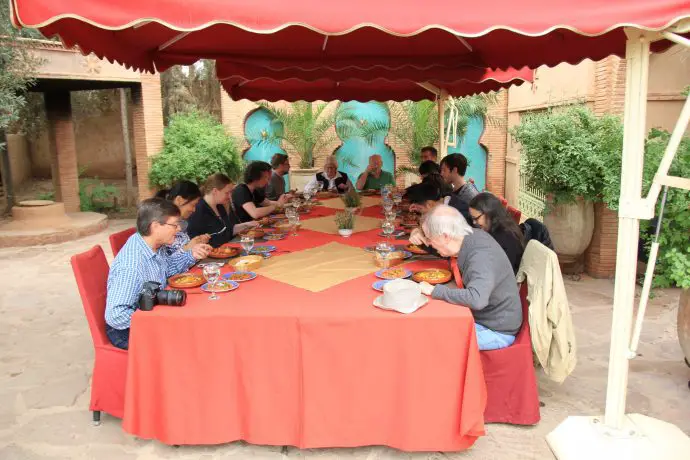
The staff at La Maison Arabe treated us to Milk Pastilla for dessert, a delectable filo pastry creation filled with milk, vanilla sugar, orange blossom water and almonds. Delicious! Much better than the bog standard slice of cinnamon dusted orange that so often serves as pudding in Morocco.
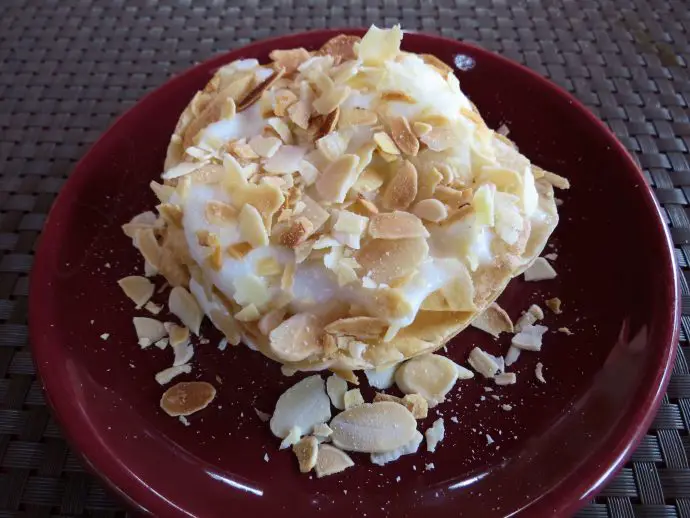
After lunch it was time for goodbyes, and the presentation of our ‘diplomas’ as well as a lovely parting gift in the form of a tagine each! I was made up, and already planning on what to cook first when we arrived home. Yet hubbie was being practical as ever. We’d only come with hand luggage so quite how we would transport them home on the plane was a bit of a dilemma.
One that I’d leave him to solve.
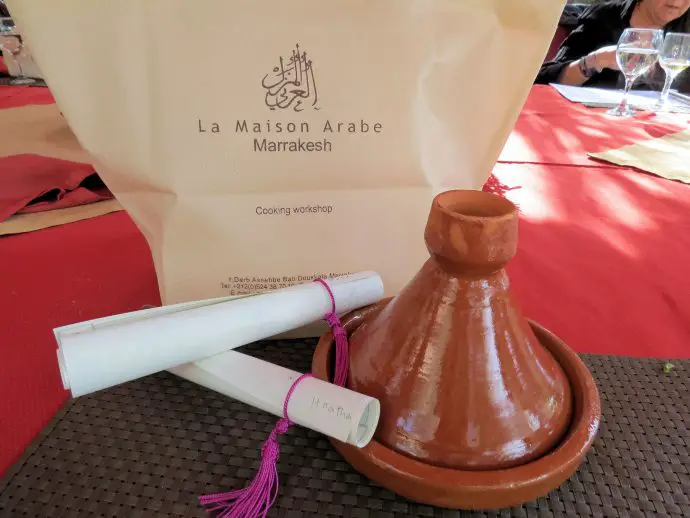
As Wafa declared at the end of the session, great civilisation and great food go together. Having spent the day cooking at La Maison Arabe, I’m inclined to agree.
Despite my best efforts at being top of the class (trying to make up for the apron error), it was hubbie who received the much-coveted praise from Wafa. I like to think it’s because he put in a lot of effort rather than because he was a better cook, but have to secretly admit that his did look a little tastier than mine.
Or maybe it was just because he’s better at talking to chicken than me!?
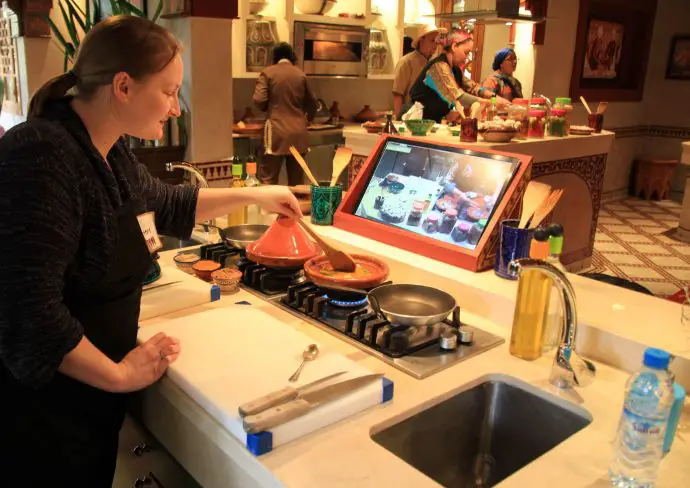
TIPS
Everyone was asked at the start of the day whether they had any special dietary requirements. There were several quite severe allergies in our group but La Maison Arabe Cooking School adapted the recipes to suit individuals.
There are 16 work stations at the country annexe so classes are small and personal.
The workshop costs 600 dirhams per person, with an optional Moroccan wine pairing with every course for an additional 150 dirhams.
The experience lasts from 10am until 2pm with participants cooking either an appetizer and a main, or a main and a dessert.
Take some dirhams if you would like drinks other than water with your meal. There is also a small shop on site.
For private classes, or for those with less time on their hands, La Maison Arabe can also run workshops at their hotel in the medina.
La Maison Arabe have produced their own cookery book with lots of secret recipes passed on through generations of Dadas, it’s a great addition to your kitchen!
Many thanks to the lovely folk at La Maison Arabe Cooking School for making learning such an enjoyable and tasty experience. Our workshop was complimentary but as always, words and opinions remain our own.
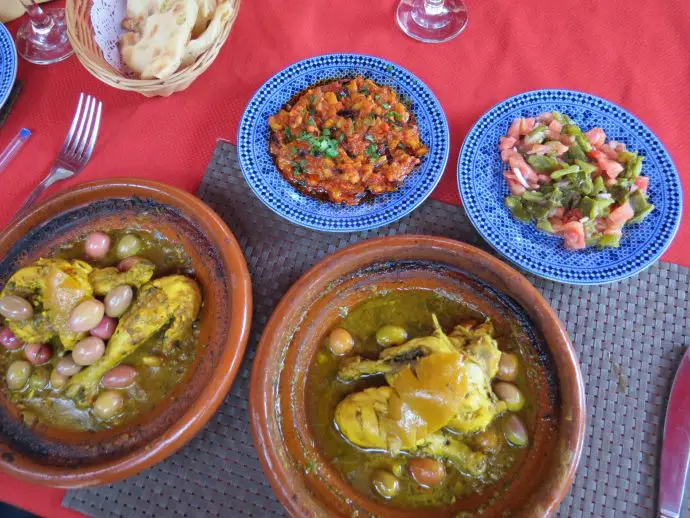
Enjoyed this post? Why not save it for later…
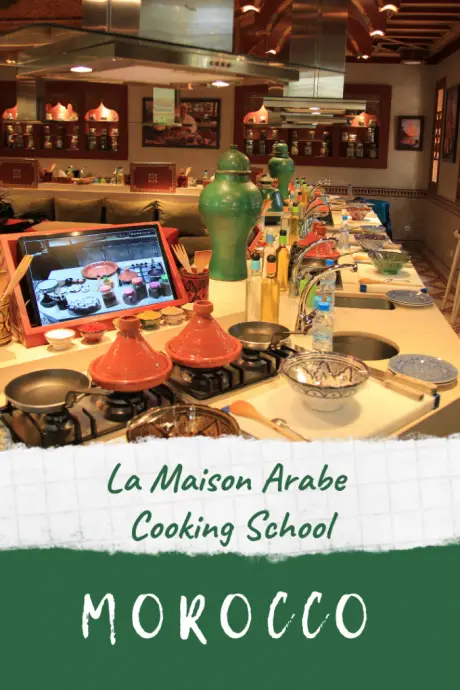

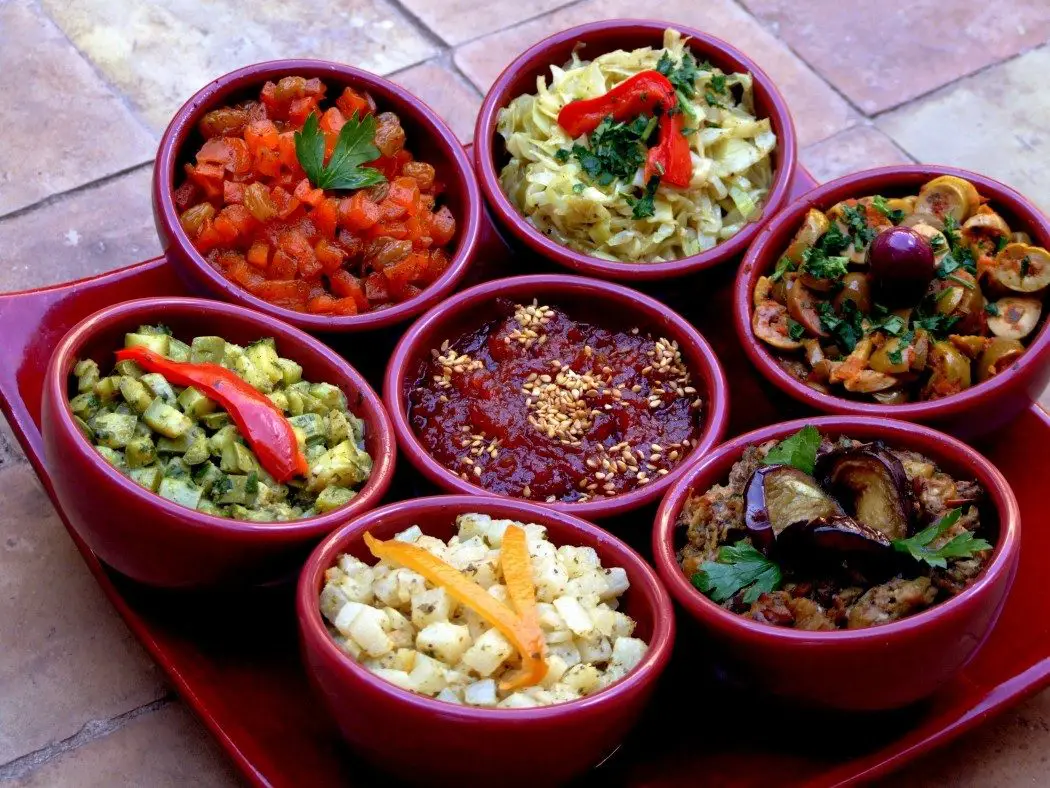

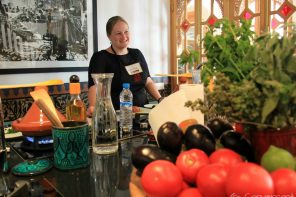
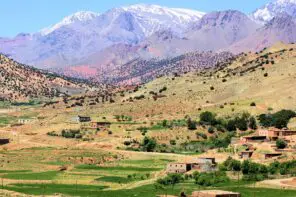

What a wonderful opportunity to learn from the best how to cook something new! Love it!
Loved this post! The quote in the beginning made me laugh out loud!
Made us laugh too…still not sure whether we were actually supposed to talk to it, or whether it was just a figure of speech!!
Oh this is making me hungry! When I eventually get to Marrakech I will be doing this for sure! What camera do you use? Your pictures are awesome!
I’ve written about our cameras here http://www.conversanttraveller.com/about-us/through-the-lens/ always fans of Canon!
I have had some good tajines and some really bad ones during my days in Marrakech. Maybe it really does depend on the way the chef talks to the chicken 🙂
I love learning how to cook local dishes that i have enjoyed. I have never been to a workshop though as i usually just ask how its cooked and then experiment when getting home
The only bad tagine we’ve ever had in Morocco was in Imlil, which we fed to a stray cat. Really makes you appreciate the effort that goes into cooking when you actually do it yourself!
This looks amazing. We walked past it when we were in Marrakech and liked the look of it. Wish we had gone in for a meal now. The cooking schools sounds great and definitely something we would try if we go back again.
You’ll have to walk in next time 🙂
Everything looked so good! Included that dessert 🙂
Tasted good too!
Looks absolutely fabulous. I love cooking classes and food tours.
Haha naughty Peter! I love reading about your Morocco experiences! I would love to pack up my things and head there for a month or two. It is such an interesting country and clearly one that knows how to eat too!
It certainly does food well! A couple of months would be fabulous, but even just a couple of days is worth the effort!
I have been wanting to visit Marrakech for ages, and that workshop looks like the perfect starter activity for when I go! Will definitely have to look it up when I finally make it there 🙂
It should be on everyone’s list for a first trip to Marrakech, hope you get to go!